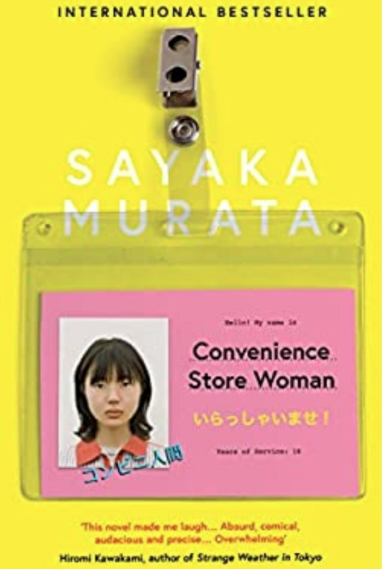
Just like last year, my first, but hopefully not last, review of the year is a contribution to Bellezza’s Japanese Literature Challenge 17.
I mentioned it last year too, I’m always looking forward to Bellezza’s event. The only difference this year – I had no clue what to pick. My Japanese TBR has grown a lot during the last couple of years and I simply had too many choices. I finally picked Convenience Store Woman because it was the one, I’ve seen reviewed the most in the last couple of months and I wanted to find out whether it really was that good.
The first-person narrator, Keiko Furukuma is a 36-year-old woman who has been working at a convenience store since she turned eighteen. She is someone who never fit in. She doesn’t understand the rules and expectations of society which leaves her confused and unmoored. The day she discovers the convenience store and starts to work there, everything changes. She loves the store, loves working at the store, loves the store’s workings, and has almost literally become a part of the store. It has entered her body and mind. And it makes her happy when it works flawlessly. The beautiful machine her life has become thanks to her dedication to the store, stops abruptly when her sister and old friends start to ask repeatedly why she’s still doing the kind of work that normally students or housewives do part time. Keiko doesn’t really know how to be a real person, as she says, but she is aware that her family and friends do not accept her way of life. To keep them off her back, she lies about her health. If she had a husband, then maybe, they would leave her be. So maybe she should look for a husband? Too bad that she’s not really interested in men. This is a very short book, so I’m not going to add much more about the story.
The book focuses very much on the present but there are a few stories from Keiko’s past which show us that she really is rather peculiar. As a small child, they find a dead bird on a playground and while all the other children cry, Keiko wants to take it home and eat it. There are also small instances of violence. Maybe this wouldn’t be so peculiar if Keiko were able to understand that some things that she did aren’t acceptable, but she doesn’t. Japanese literature is full of quirky characters and most of the time I find them endearing. Not Keiko though.
I found this book very interesting and thought-provoking. I know many readers read it as a piece of feminist fiction, but I feel it’s more than that. In the book, men who are like Keiko face the same pressures. There might be less pressure to get married and have children but the expectations to get a “real job” might be even greater.
It is never said, but while reading this book one gets the impression that Keiko is neurodivergent. That means, there’s even more societal pressure because anything she might do or say alienates people. She knows this but she doesn’t know why and not how to be different. The people around her think she must be unhappy with her life but the only thing that makes her unhappy is their pressure. The way she describes work at the shop made me think of those monks who rake Zen gardens to perfection. Making them look tidy and neat is a meditative endeavour. Keiko’s efforts to keep everything clean, tidy, and running smoothly, is more obsessive than meditative but there is a similar satisfaction in a job well done. I loved reading about the shop, about the way weather and seasons affect sales and many of the other things that are important like how to promote certain foods or display goods in an advantageous way.
What I liked most about the book is how it shows us the arrogance of society in general towards those who do these kinds of tasks. Some people enjoy this kind of work very much and that should count for something, but it doesn’t. Maybe the pressures are a bit extremer in Japan, but Western society also judges people who don’t want to have a career or a family. We still have a long way to go to accept diversity in lifestyle.


I really enjoyed this novel. The comparison with the monks in the Zen gardens hadn’t occurred to me but I totally agree!
Nice to know you liked it too. I tried to find out if the author mentions Buddhism somewhere but couldn’t find anything. That picture of those Zen gardens just always popped up in my mind.
I loved this book. In fact it’ll be on my best of 2023 list if I ever get to write it up. I thought it quietly subversive. Keiko has found her niche, but somehow that isn’t good enough because of expectations and stereotypes. But as Keiko shows, those are just things some people have decided, there’s no necessary logic to them…
I agree. I was thinking if everyone would get as much joy out of their work as she does it would be miraculous. Quietly subversive is an excellent way to describe it.
I hope you’ll write your best of. I’d love to see it.
Most readers who’ve tried this notice that Keiko might be autistic, but the writer and translator always push back against the idea!
Interesting. Thanks for telling me.
Maybe I’m making this comparison because I just rewatched the film last night, but the way people judge Keiko and anyone who stands out, is different, doesn’t behave in the expected way, reminds me of the Kaspar Hauser film by Werner Herzog. And how we like to soothe ourselves with the illusion that ‘these people are clearly different because they are ill or disabled or something’.
That‘s a very good Point. I was actually disappointed that she chose a neurodivergent person because I thought it would have been more powerful if she didn’t. Now, I realize she didn’t but most people assume she did. I would like to see the movie.
I mean, what is normal anyway?
Lovely to revisit this book through your eyes, Caroline. I really liked it, too. It’s interesting how Sayaka Murata and other female Japanese writers are subtly pushing back against the traditional / conventional expectations of their society. I would also recommend her short story collection, Life Ceremony – it’s darker and more subversive than Convenience Store Woman, but very thought-provoking!
Glad to know you liked it too. Thank you for the suggestion. I could imagine she’s excellent in the short form. In many ways, they do it even more than Western writers.
It’s great when events push us to finally make room in our stacks for the books unread on our shelves. This is one that I listened to as an audiobook and I found it quite compelling (and I’m not always an attentive listener…I like to see the words on the page).
I agree. I really like that too. I could imagine this would work well as an audio book. Like you, I’m not the most attentive listener. Glad to know you liked it as well.
Excellent review–you make a great point “What I liked most about the book is how it shows us the arrogance of society in general towards those who do these kinds of tasks. Some people enjoy this kind of work very much and that should count for something, but it doesn’t.” So sadly true. I count this book among my “new” life-time favorites. It made a real impact on me.
Thank you so much. It’s a wonderful book. I’m glad you liked it as much as I did.
Wonderful review, Caroline! I don’t know how I missed your review! So glad you liked this one. Loved what you said about the Zen monk sweeping the monastery and how it is meditative. I loved this book. Now after reading your review, I want to read it again. Thanks for sharing your thoughts 😊
Thank you so much, Vishy. I miss reviews all the time. I set up a new Feedly account to keep track. I’m glad you liked it too. I think this could be one I would reread as well.
This was one of my favourite books the year I read it, and I very much agree with what you have to say about it. Though there is clearly a pressure to conform in Japanese society, I feel the that is also true here though we often don’t want to admit it. Have you read anything else by Murata? Her other work takes non-conformity to extremes!
I’m glad to hear you felt the same. I agree, there’s a pressure here too. Better hidden as everyone wants to appear so open minded.
I haven’t read anything else by her but read a review that made me think some of her other work might be a bit too dark right now. I guess, you’ve read more of her. Would you recommend it?
I liked her other work but it is very dark and ‘out there ‘. If you were going to try anything else I would start with the short stories as some are more like Convenience Store Woman in tone.
Thanks for this recommendation.